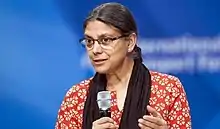Prof. Geetam Tiwari is currently the TRIPP Chair Professor at the Department of Civil Engineering of the Indian Institute of Technology in New Delhi, India.
She teaches transportation planning, traffic engineering, and transport economics and finance, transport safety, and non-motorised transportation to undergraduate and graduate students.[1][2][3]

Education and biography
Tiwari finished her Bachelor of Architecture from the then University of Rourkee, Rourkee (currently Indian Institute of Technology Rourkee) in 1980 and worked for a year as Assistant Architect at the Uttar Pradesh State Construction Corporation, in Lucknow. She later attended the School of Urban Planning and Policy, University of Illinois at Chicago, where she earned a Masters in Transport Planning and Policy and later a Ph.D. in Public Policy Analysis (Transport Planning). After serving as visiting faculty in the School of Planning and Architecture, Delhi, and as a consultant, she joined IIT Delhi in 1990 as a Senior Scientific Officer in the Applied Systems Research Programme, which would later be named the [Transportation Research and Injury Prevention Program (TRIPP).[4][5][6][7]
Professional career
Tiwari was appointed an honorary doctor by Chalmers University of Technology, Sweden in 2012, for her research on transport. She and her research group have contributed to knowledge on urban traffic patterns of various vehicles, public health effects in the urban environment, and the relationship between the municipal infrastructure and traffic safety. Their research led to the introduction of Bus Rapid Transit Systems in Delhi and guidelines for the design of highways and streets in urban environments. These have resulted in improved accessibility and traffic safety, as well as fewer emissions of greenhouse gases and less pollution in general.[8] In addition to her teaching and research, Tiwari is one of the directors of Innovative Transport Solutions (iTrans)[9] and is a member of working groups on Urban Transport for the twelfth Five-Year Plan of India[10] and the National Transport Development Policy Committee (NTDPC).[11]
Tiwari has written, edited, and contributed to various books in the field of urban transportation systems, road safety, and injury prevention. These include The Way Forward: Transportation Planning And Road Safety,[12] Injury Prevention and Control [13] Urban transport for growing cities: high capacity bus system,[14] and Road Traffic Injury Prevention: Training Manual.[15] Tiwari has authored and co-authored numerous international peer-reviewed journal articles.[16][17][18][19][20][21][22][23]
References
- ↑ "Civil Engineering Department". Archived from the original on 22 January 2013. Retrieved 11 April 2013.
- ↑ "Transport research and injury prevention programme". tripp.iitd.ernet.in. Retrieved 3 October 2014.
- ↑ "Faculty". te.iitd.ac.in. Retrieved 3 October 2014.
- ↑ "Selected research areas". Retrieved 11 April 2013.
- ↑ "Geetam Tiwari - India Environment Portal | News, reports, documents, blogs, data, analysis on environment & development | India, South Asia". indiaenvironmentportal.org.in. Retrieved 3 October 2014.
- ↑ "Geetam Tiwari | BMW Guggenheim Lab". bmwguggenheimlab.org. Retrieved 3 October 2014.
- ↑ Jönson, Gunilla; Tengstrèom, Emin (2005). Urban transport development. Springer. ISBN 9783540277613.
- ↑ "Chalmers' honorary doctors 2012". chalmers.se. Retrieved 3 October 2014.
- ↑ "People :: iTrans". itrans.co.in. Retrieved 3 October 2014.
- ↑ "Recommendations of Working Group on Urban Transport for 12th Five Year Plan" (PDF). 20 September 2011. Retrieved 3 October 2014.
- ↑ Anvita (30 March 2012). "NTDPC on Urban Transport - Final Report" (PDF). Archived from the original (PDF) on 6 October 2014. Retrieved 3 October 2014.
- ↑
- ↑
- ↑ Tiwari, G. (2002). Urban transport for growing cities: high capacity bus system. Macmillan. ISBN 9780333937846. Retrieved 3 October 2014.
- ↑
- ↑ Fazio, Joseph; Tiwari, Geetam (1995). "Nonmotorized - Motorized Traffic Accidents and Conflicts on Delhi Streets". Transportation Research Record. 1487: 68–74. Retrieved 23 August 2015.
- ↑ Tiwari, Geetam; Mohan, Dinesh; Fazio, Joseph (March 1998). "Conflict Analysis For Prediction of Fatal Crash Locations in Mixed Traffic Streams". Accident Analysis and Prevention. 30 (2): 207–215. CiteSeerX 10.1.1.134.5457. doi:10.1016/S0001-4575(97)00082-1. PMID 9450124.
- ↑ Fazio, Joseph; Hoque, Md. Mazharul; Tiwari, Geetam (1999). "Fatalities of Heterogeneous Street Traffic". Transportation Research Record. 1695: 55–60. doi:10.3141/1695-10. S2CID 110847790.
- ↑ Tiwari, Geetam; Fazio, Joseph; Gaurav, Sushant (August 2007). "Traffic Planning For Non-Homogeneous Traffic" (PDF). Sādhanā. 32 (4): 309–328. CiteSeerX 10.1.1.571.1226. doi:10.1007/s12046-007-0027-5. S2CID 109322941. Retrieved 23 August 2015.
- ↑ Tiwari, Geetam; Fazio, Joseph; Gaurav, Sushant; Chatteerjee, Niladri (March 2008). "Continuity Equation Validation For Nonhomogeneous Traffic". Journal of Transportation Engineering. 134 (3): 118–127. doi:10.1061/(asce)0733-947x(2008)134:3(118).
- ↑ Gupta, Udit; Tiwari, Geetam; Chatterjee, Niladri; Fazio, Joseph (2010). "Case Study of Pedestrian Risk Behavior and Survival Analysis" (PDF). Journal of the Eastern Asia Society for Transportation Studies. 8: 2095–2111. Retrieved 23 August 2015.
- ↑ Tiwari, Geetam; Khatoon, Mariya; Singh, Niharika; Choudhary, Prateek; Fazio, Joseph (2011). "Modification of a Highway Capacity Manual Model for Evaluation of Capacity and Level of Service at a Signalized Intersection in India". Journal of the Eastern Asia Society for Transportation Studies. 9: 1558–1571. doi:10.11175/easts.9.1558.
- ↑ Gandhi, Sandeep; Tiwari, Geetam; Fazio, Joseph (2013). "Comparative Evaluation of Alternate Bus Rapid Transit System (BRTS) Planning, Operation and Design Options". Journal of the Eastern Asia Society for Transportation Studies. 10: 1292–1310. doi:10.11175/easts.10.1292.